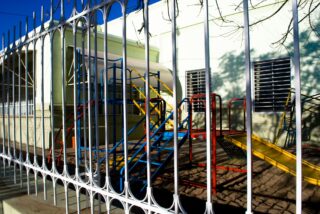When challenged with exam questions concocted by his government for ten- and eleven-year-olds, David Cameron avoided answering, instead gloating that children today are better educated than he was. Likewise, the British Schools Minister Nick Gibbs flunked the grammar exam question directed at him before giving a spiel about the importance of grammar. To add to their embarrassment, the government U-turned on their plan to force all schools across the country to become academies, due to internal opposition and after the Education Secretary Nicky Morgan was heckled as she announced the government’s academization strategy. Despite much criticism David Cameron is “absolutely delighted” with the changes to British education. But intensified learning coupled with funding cuts and groundless, undemocratic policy changes are counteracted by the resilience of teachers who adapt and resist creatively to the reforms imposed upon them.
Children’s creativity is stifled by a restrictive English curriculum
As a teaching assistant in a London primary school, I don’t need to look hard to discover the effects of Cameron’s educational reforms that run contrary to expert opinions. Flicking through a child’s literacy book, I read the formulaic results of the Tory English curriculum focused on grammar and spelling:
“Looking around, my eyes were bombarded with the gleaming, glaring sunlight hitting the tranquil, serene water. It was like a colossal, concealed blanket over the ocean. I could perceive the immense, bulky [ship].”
And on it goes, adjective after adjective. The children are given a checklist of different sentence types that they should use. Above, this high-ability ten-year-old has employed the ‘two A’ sentence type, in which two adjectives are used in conjunction. Such work, written by children educated under Cameron’s government, is easy to spot; their writing is theatrical and exaggerated. Other times pupils awkwardly insert different sentence types that don’t fit, simply because they have been told that they should include such sentences in their work.
Teachers suddenly have to contribute double to their pensions while their salaries remain the same
While children’s creativity is stifled by a restrictive English curriculum, mathematics is taught in more depth earlier on. Children learn what their peers in other countries learn two years later, putting an unnecessary amount of pressure on pupils as young as six when it comes to exam time. Progressive, high-ranking education systems in places such as Finland and Singapore put no such pressures on children. Professor Terry Wrigley of Leeds Metropolitan University told the Guardian, “it sets up the majority of children to fail. The curriculum documents for Finland and Singapore make no demands for eight-year-olds to count in sevens and nines, or for the learning of long lists of spellings which exceed the range of children’s active vocabulary.”
Alongside the extra workload for school staff, Ofsted standards have risen, funding has been cut and teachers have suddenly had to contribute double to their pensions while their salaries remain the same. Schools in London face cuts of up to 20%, leading them to make “non-essential” staff redundant: ie. teaching assistants. In the school where I work this implies that, due to funding technicalities, the only black member of staff will lose her job. This is a great shame for the school. Firstly, she is strongly aware of children’s social needs, an integral role of many TAs. Secondly, this worker, in a school of mainly non-white children, is the extent of the school’s ethnic representation, a feature of good education that is proven to increase pupils’ motivation to learn.
50% of teachers said they see pupils coming to school hungry up to four times a week
Meanwhile, that most basic enabler of brain development: food, has also been restricted by the government. The Conservatives rejected projects designed by the Department for Education to increase school dinner uptake on the grounds that these would not create enough profit. Prior to that, the coalition government deregulated the nutrition of school meals, largely undoing the work of Jamie Oliver to improve children’s eating. Where I work the majority of children are on free school dinners so rely on the meals provided in school. In a YouGov survey 50% of teachers said they see pupils coming to school hungry up to four times a week. It is worrying then, that I spend my lunch duty encouraging children to eat just one more mouthful of grey, over-boiled vegetables, dry rice or soggy chips from a plate of food they have barely touched.
Educators and parents struggle against the government who bear down upon them. In response to the shoddy new SATs standards, 30,000 people signed a petition to boycott primary school exams. But opposition also emerges on a smaller scale, through everyday forms of resistance within schools.
Increasingly intensive and less inspiring, the current curriculum troubles many teaching staff who must reconfigure it to fit their own ideals. A teacher working in a school labelled as ‘failing’ told me that they often ignore the dictates of the curriculum because they feel it does not benefit their pupils. Rather than focus only on language technicalities, school staff try to retain the creative aspect of English. One year three teacher said, “Within my own English lessons I very much value content and an enjoyment of writing, reading and poetry but this is less easy whilst fitting in and having to assess the technical aspects of a young child’s writing.” Neglected subjects such as art or sport are incorporated into maths and English. A teacher from my old primary school explained: “our topics tend to be science, history, geography, art or music based so we try as far as possible to integrate these subjects into the English that we teach, although this is harder in maths – but not impossible! We work very hard to find interesting and creative ways to allow the children to achieve the skills required by the curriculum whilst still enjoying what they do!” The classroom I work in contains a very attractive display of fractions drawn in bubble writing and elaborately decorated in different colors, another way the dry curriculum is made more interesting for children.
In Britain we are experiencing, quite literally, an assault on childhood
The fractions hang alongside our compulsory display of ‘British values’, whatever those are. Subversively, the class teacher at the school I work in has filled this space with an Amnesty International poster of the Universal Declaration of Human Rights. Schools interpret ‘British values’ in dramatically different ways. Whereas one school I worked in had a rather banal display of ideals such as ‘equality’ and ‘freedom’, a teacher I spoke to working in the South West explained, “the British Values curriculum is still being integrated into our system but the pressure is starting to come into force as we have to show this as part of Ofsted… I have got round it this year by involving my children in protests and discussions of democracy and democratic rights as part of the classes.” From talking to various staff working in different primary schools I have found that teachers vent their frustration at the government’s misunderstanding of pupils’ needs by teaching the curriculum in ways that they see to be more beneficial to the development of real children.
In my work I witness the daily effects of the Conservative’s new curriculum, the withdrawal of the state from education, and the government’s harsh austerity measures. And although many find ways around Conservative education policies, others are unable to cope. An unprecedented percentage of teachers consider quitting due to the quality of education. The state of British education was described aptly by the bestselling children’s author Meg Rosoff, who said at a recent award ceremony, “It is no wonder that teachers in the UK are quitting in record numbers. It has become a joyless profession. Learning has become joyless as well, and students are not able to quit. In Britain we are experiencing, quite literally, an assault on childhood.” A teacher working in the Bath area reiterated this, saying, “[our primary school] tries hard to retain a child-centred approach but the pressure is on for us all to comply with the teaching standards set down by the government.”
She added “teaching doesn’t seem to be much to do with the child anymore but about figures and statistics.” Yet in the face of the changes imposed, the school staff who stick at it often evade the government’s backwards education policies, teaching the elite the lesson that children will not be molded by careless hands.
Image: Pablo Romeo



